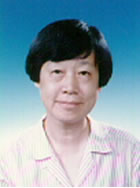
Dr. Meemann Chang (Chinese: 张弥曼, 1936-), former director of the Institute of Vertebrate Paleontology and Paleoanthropology (IVPP) in Beijing. Her work has helped clarify the links between the fish that swam in Earth's oceans 400 million years ago and the air-breathing, land-walking creatures that evolved from them. She has played a key role for years in bringing little-known Chinese fish fossils to the attention of the scientific world.
Chang's career has been far from straight-forward. Along with her successes, she has also faced significant difficulties, thanks to the shifting political landscape of her homeland. Despite such problems, her enthusiasm for her subject remains undimmed. "I am still digging and collecting fossil fishes," she smiles during an interview at the conference in Arizona.
Chang's father, a gifted pathologist from Nanjing, wanted her to become a physician, but love of her country led her to choose geology instead. In 1958, during the Great Leap Forward, she was among those who heeded the call of vice-president Liu Shaoqi to study the Earth so that China might exploit its natural resources, such as oil. For Chang, that introduction to China's rocks set her on the path to study fish fossils, a quest that has taken her to all the continents of the world.
In 1965, Chang was chosen to do graduate research at the Swedish Museum of Natural History in Stockholm, one of the leading research centres in palaeontology. But her time there was to prove short-lived. When the Cultural Revolution swept China in 1966, Chang, ever the patriot, halted her studies and returned home. In Beijing, Chang was confronted by the new phenomenon of the Red Guard who 'purified' China by isolating and punishing the academic classes.
Chang's career has taken her through many countries, and allowed her to pick up numerous languages. She earned her undergraduate degree in 1960 at the Lomonosov Moscow State University, where she became fluent in Russian. She learned modest Swedish while in Stockholm, is fluent in English and reads German and French. But she is also adept at deciphering another language: that of fossilized remains. She can readily navigate a path from the 'age of fish' 400 million years ago in the Devonian period, through to the end of the dinosaur age and the Cretaceous period 65 million years ago.
In her current studies, Chang is working to understand the species distribution pattern of fish across the Pacific Ocean — a distribution that reached its maximum during the Eocene epoch, between 34 million and 56 million years ago. Most of these fish became extinct in the western Pacific, she notes, but a few, such as the coelacanth, still survive in the eastern Pacific. "Tracing the origins and distribution of these fish is a very exciting endeavour," she says.
Chang's contribution to Chinese palaeontology was recognized in 1983 when she became the first woman to head the IVPP. This was significant not only because of her gender but because it marked the IVPP's move away from political appointments to those based on merit. Chang served two terms as director, ending her tenure in 1990, and helped shepherd the institute from the days when whole families were living on an upper floor of the research building, to a new facility that included modern laboratories. She became an Academician of the Chinese Academy of Sciences in 1991.